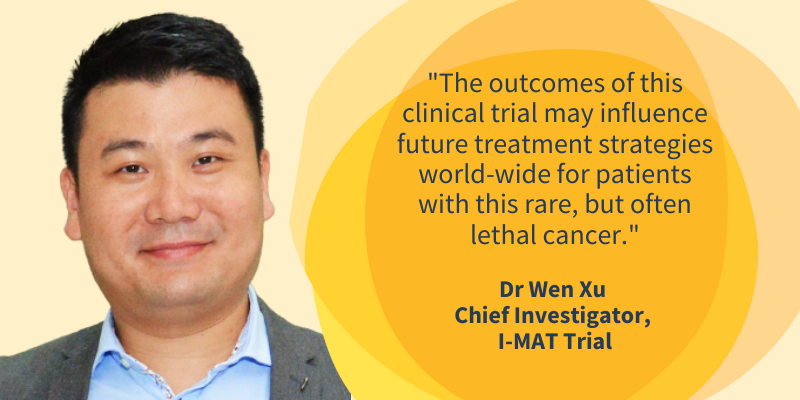Immunotherapy has revolutionised treatments for melanoma, and for many Australians, even an advanced melanoma diagnosis is no longer a death sentence.
While melanoma is common, it is not Australia’s deadliest skin cancer. Merkel cell carcinoma – a rare, highly aggressive neuroendocrine skin cancer that tends to metastasize very quickly – affects around 300 Australians each year. Even if diagnosed early and treated with surgery and / or radiotherapy, around 40% of patients with Merkel cell carcinoma will relapse. Once a patient develops metastatic Merkel cell carcinoma, only 14% of patients will survive for five years.
Dr Wen Xu, a medical oncologist at the Princess Alexandra Hospital in Brisbane, believes that the great progress made with immunotherapy for melanoma patients will also apply to Merkel cell carcinoma.
As the Chief Investigator of an Australia-wide clinical trial, he is now testing this theory by giving patients with early-stage Merkel cell carcinoma an immunotherapy drug after their initial surgery and / or radiotherapy for the cancer to improve their cure rates.
“We already know that immunotherapy can work very well in patients with advanced Merkel cell carcinoma but the treatment remains untested and unproven for patients with early stage disease,” Dr Xu said.
“The I-MAT clinical trial will provide high-quality data to determine if a six-month regime of the immunotherapy drug, Avelumab, is well-tolerated and can eliminate residual microscopic cancer cells, thus reducing the risk of the cancer reoccurring and improving cure rates for patients with early-stage Merkel cell carcinoma.”
“Merkel cell carcinoma patients are typically elderly and can have other medical problems, so these patients tend to really struggle with chemotherapy. Immunotherapy is a much more preferable treatment than chemotherapy for these patients as it has much lower side effects and enables a better quality of life during treatment.”
“The outcomes of this clinical trial may influence future treatment strategies world-wide for patients with this rare, but often lethal cancer,” he said.

To ensure a true representation of Merkel cell carcinoma patients in the community, the trial is open at hospitals in most Australian capital cities, as well as six regional towns. Plans are underway to open more regional sites.
Dr Xu said running the trial in regional towns was important to provide regional residents with more equitable access to advances in cancer treatments.
“Queensland has the highest rate of Merkel cell carcinoma in the world and many of these patients live in regional areas, and in the past they would have had to travel long distances to a capital city to access a cutting-edge trial treatment.”
“We aim to provide easier access to this trial for regional patients, which could really improve their outcomes without the need for a long commute,” Dr Xu said.
The I-MAT clinical trial aims to enrol 132 participants with stage I-III Merkel cell carcinoma. To participate in the trial, visit the I-MAT website page for more information.
The trial is coordinated by Melanoma and Skin Cancer Trials Ltd, a non-profit organisation that brings together a powerful network of professionals to deliver clinical trials that advance treatments for melanoma and skin cancer.
To support the work of Melanoma and Skin Cancer Trials donate here.

